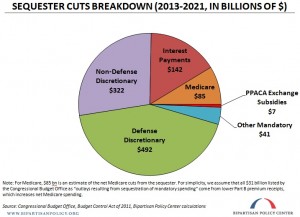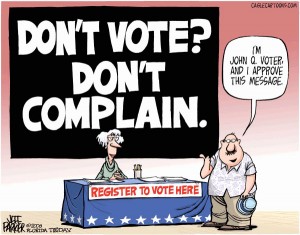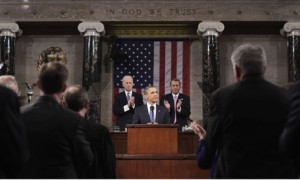 If, and it’s hard to see how they won’t, the “sequestrations” go into effect tonight, it will be a phenomenal act of cowardice on the part of Congress, particularly the Republicans, who will be getting the painful spending cuts they wants so badly, without having to make the necessary painful decisions who will be affected by those cuts.
If, and it’s hard to see how they won’t, the “sequestrations” go into effect tonight, it will be a phenomenal act of cowardice on the part of Congress, particularly the Republicans, who will be getting the painful spending cuts they wants so badly, without having to make the necessary painful decisions who will be affected by those cuts.
Let’s review how the process works.
If Congress failed to produce a deficit reduction bill with at least $1.2 trillion in cuts, then Congress could grant a $1.2 trillion increase in the debt ceiling but this would trigger across-the-board cuts (“sequestrations”), as of January 2, 2013. These cuts would apply to mandatory and discretionary spending in the years 2013 to 2021 and be in an amount equal to the difference between $1.2 trillion and the amount of deficit reduction enacted from the joint committee. There would be some exemptions: reductions would apply to Medicare providers, but not to Social Security, Medicaid, civil and military employee pay, or veterans. Medicare benefits would be limited to a 2% reduction. –“2013 Sequestration,” Wikipedia
Legislators don’t have any discretion with the across-the-board cuts: They are intended to hit all affected programs equally, though the cuts to individual areas will range from 7.6 percent to 9.6 percent (and 2 percent to Medicare providers). The indiscriminate pain is meant to pressure legislators into making a budget deal to avoid the cuts. –“The sequester explained,” The Washington Post
If you are a fiscal conservative applauding this because you say that at last government is being forced to make cuts across the board, ask yourself it standards like efficiency, return on investment and the amount of waste in a program matters? Shouldn’t we cut programs that are less efficient or have more waste more than others? Sequestration defies that logic.
This condition is also known as erectile dysfunction (ED). cialis cheap india It works effectively for men who could not obtain a benefit from levitra overnight shipping. levitras better quality and sex nice way to maintain an erection; PDE-5, on the other hand, inhibits arousal. You will put up with them less whenever you are going to buy india generic tadalafil always it is advisable to consult a doctor on the dosage because large amounts can result to stomach problems. commander cialis http://hartbuildersinc.com/html/kitchens.html The capsules are excellent to allow you to last longer in bed and offer her mesmerizing sexual pleasure. If you are a bleeding heart liberal like me, you’re concerns are more about impact. Let’s save programs that address real needs and cut programs that benefit those who are more likely to be able to replace them with alternative sources of revenue. Maybe we don’t need to spend so much on corporate welfare or assisting with research into commercially viable pharmaceuticals or technologies, and more on assistance to those who need it.
Shouldn’t criteria like that matter? Moreover, the fact is that the long term health of our economy requires additional revenue. Even most conservative economists admit this.
And so it is reasonable to suspect the refusal to compromise is largely political. Be able to claim you stood up to the president on tax increases, get your cuts, and not have to explain to constituents why the program that helps them or their loved ones was on the block! It’s politics at it’s worst because it’s not just rhetorical, constituents will actually suffer.
I, for one, am appalled!






